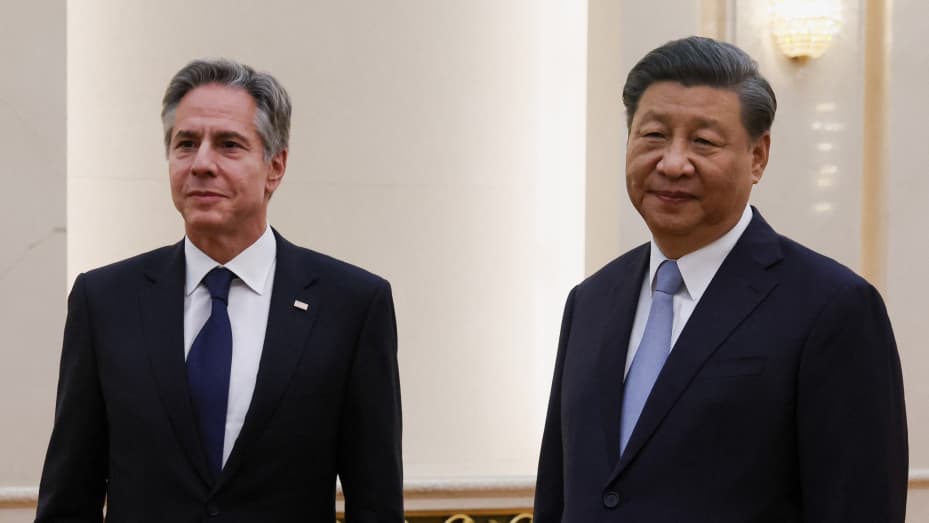KEY POINTS
- A hallmark of U.S-China tensions in the past few years has been the battle between the two nations for tech supremacy.
- Washington has sought to cut off China from key technology like semiconductors while China has looked to boost its self-sufficiency and wean itself off American technology.
- Now analysts say that generative artificial intelligence, the technology behind OpenAI’s ChatGPT, could be the next battleground between the two nations.

Generative artificial intelligence, the technology that viral chatbot ChatGPT is based on, could be the new battleground in the battle for tech supremacy between the U.S. and China, according to one analyst.
Despite the two nations seeking better relations after U.S. Secretary of State Antony Blinken met with Chinese President Xi Jinping this week, analysts said the tech tensions will continue.
Washington has sought to cut off China from key technology like semiconductors while China has looked to boost its self-sufficiency and wean itself off American technology, touting its domestic sectors.
“The status quo isn’t likely to change much on any front — from sanctions to business pressure,” Abishur Prakash, CEO of Toronto-based advisory firm, The Geopolitical Business, told CNBC via email.
AI, which is seen as a critical technology by both nations, will likely be dragged into the battle between the two sides.
AI in the ‘crosshairs’
Former President Donald Trump began a trade war with China and technology was dragged in the middle Washington’s tactics so far have relied on restricting China’s access to technologies it deems critical such as semiconductors.
An escalation occurred last year when the U.S. introduced sweeping rules aimed at cutting China off from major tools and components to make advanced chips and choking the country off from critical semiconductors. The move was seen as potentially hobbling China’s homegrown chip industry. U.S. has also got allies to align on tough export rules of tech to China.
Meanwhile, the U.S. has looked to boost its own domestic technology including semiconductors, with funding such as the $52 billion available via the Chips and Science Act.
Washington’s attention is now likely to turn to generative AI.
“There will likely be more attempts coming from Washington to target the development in China of some types of applications, and generative AI could be in the crosshairs in the coming year,” Paul Triolo, the technology policy lead at consulting firm Albright Stonebridge, told CNBC.
It comes “as the Biden administration determines which technologies could benefit both China’s military modernization, and which could also boost Chinese companies’ ability to make breakthroughs in generative AI,” he added.
Generative AI relates to applications such as ChatGPT which are able to generate content when prompted by users.
How U.S. restrictions target A.I.
AI needs to be trained on huge amounts of data in order to work. Generative AI is based on so-called large language models, meaning it is trained on huge amount of language in order to be able to understand and respond to prompts from users.
The processing of this data requires a large amount of computing power that is powered by specific semiconductors, such as those sold by U.S. firm Nvidia, which is seen as the market leader in such chips.
Part of the U.S.’s current restrictions aim to cut China off from some of Nvidia’s key chips, which in turn could hamper China’s AI development.
Washington is also carrying out an outbound investment review, which would put rules in place for American investment into foreign companies.
“The upcoming outbound investment review executive order will include restrictions on U.S. investment in some AI-related technologies, and this will be a major indication of the direction of U.S. technology controls in the final two years of the Biden administration,” Triolo said.
China’s generative A.I. push
ChatGPT, developed by American firm OpenAI, has taken the world by storm and has sparked somewhat of an AI arms race between U.S. technology companies including Microsoft, which is an investor, and Alphabet.
Chinese technology giants have taken note.
Over the past few months, Chinese technology giants from Baidu to Alibaba have announced plans and launched trials for their own ChatGPT rivals.
Complete Article > U.S.-China tech war: Why Generative AI could be the next battleground (cnbc.com)








